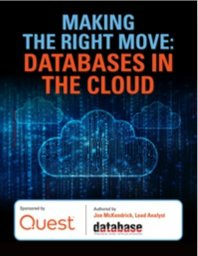Making the Right Move: Databases in the Cloud
For database managers and users, moving to the cloud means breaking through the confines imposed by capacity ceilings, speed limits, performance issues, and security concerns. It also assures more opportunities to deliver insights and capabilities to their businesses, and less time enmeshed in day-to-day maintenance issues.
At the same time, moving to the cloud does not mean outsourcing control or responsibility for data to an outside provider, and care must be taken to ensure migrations take place with as little disruption to the business as possible. In addition, organizations need to be prepared with the specific skills required to migrate to and manage databases in the cloud.
Before undertaking a cloud migration, these questions need to be asked:
In this special report, we will address these questions that accompany database cloud migration.
Read More
By submitting this form you agree to Quest UK contacting you with marketing-related emails or by telephone. You may unsubscribe at any time. Quest UK web sites and communications are subject to their Privacy Notice.
By requesting this resource you agree to our terms of use. All data is protected by our Privacy Notice. If you have any further questions please email dataprotection@techpublishhub.com
Related Categories: Applications, Backups, Big Data, Cloud, Cloud Computing, Cloud Platforms, Cloud Security, Data Center, Data Centers, Data management, Data Storage, Databases, ERP, Hardware, Hybrid Cloud, Server, Software, Storage, Virtualization


More resources from Quest UK

10 Ways to Fortify Ransomware Recovery Defens...
Ransomware has become a 'cyber-pandemic' that shows no signs of diminishing anytime soon. Your ransomware recovery capabilities must be up to the c...

The Top Five Reasons to Choose Toad Over SQL ...
Now that DevOps initiatives are becoming the norm, you're under increasing pressure to deploy application changes in record time. But shorter timel...

DBA's Look to the Future: PASS Survey on Tren...
Download this special research report today to learn about the latest trends in SQL Server environments, including the evolving data landscape, pre...